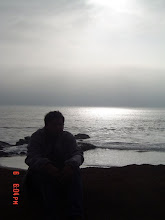I dedicate this blog to one of my very good friends, :);)\!*, who happens to be an IITian, and who is currently undergoing the blues of separation from one's alma mater.
Before you proceed, let me acknowledge the triumph of sanity over anger; and the victory of the good over the evil forces. May the force be with all of us. :)
______
Well, I unfortunately joined the "BITSAT vs IIT-JEE" community in orkut 15 minutes back. The seemingly hopeless and pointless discussions that followed there made my blood boil. I am a proud BITSian; and vanity happens to be my favourite sin too. I would consider BITS to be the haven on earth. Well, I am free to think what I want, right. I would definitely not like any Tom, Dick and Harry disrespecting my mother - alma mater without knowing her, her love for her children, etc. The least I can do is to write this article. In case I have offended the ones under target, I shamelessly would not apologise for that. However, I do respect the IITs..and her right-minded, right-thinking (no political overtones intended) IITians. Lastly, this is definitely not a case of grapes having gone sour.
What prompted me to write this article, was the lack of humility among certain people. I don't want to point fingers at any one. I personally know of many IITians and BITSians, some really close, and from what I know of them, they are the perfect gems that you can find in any friend or person. Their humility, zeal for life, passion for what they do, etc., has often been a source of inspiration to me. But then, there are certain people who infact debase themselves courtesy their unwanted/excessive pride to the absurd heights of vulgar marketing of supposedly their own "intelligence". I guess, only, empty vessels make more noise. People who really have the right stuff inside them pursue their destiny in silence. Period.
Btw, does it make sense to think about the IITs and BITS alone when it comes to college undergraduate education? What about other colleges? Well, from my personal experience, it doesn't really matter as to where one is from. It rightly depends on the individual and the individual alone. Trumpeting your own trumpet or living under the illusions/delusions of being geniuses amounts to slandering the pure institution of a mother. It doesn't speak good about a person and more importantly about his/her alma mater. More often than not, she moulds us in more ways than one.
We are given the most important lessons in life, straight from a loving mother's mouth, and I am sure those lessons would be for life. Where we are taught to live by ourselves, where we are fortunately/unfortunately forced to learn to live with the same set of people, where heady independence is provided to let one chart one's own destiny, where the world is that small place, etc. And since all educational institutions are the places of learning the intricacies of life, both academic and non-academic, it does seem reasonable to respect all of them.
From the author's personal experience with himself and with many of his friends and acquaintances, the unshaken and unquestionable fact is the love of the alma mater for her children and vice-versa. Most people become dangerously attached to her - she lovingly fondles, embraces and cherishes your presence for 4-5 years - the most important phase in one's life - the transition from angry adolescence to mature youth. When we think that everthing is perfect, nothing else can be better, where the present way of life seems to be the best possible, where friends are selected with care, then, all of a sudden, she betrays you. Or rather her genuine love, care and concern force her to violently throw out her child from her circle of concern and influence. Needless to say, the lessons learnt from her would be permanent and the friends made there would become friends for life. So, does it matter if she happens to be an IIT or a BITS or any other place? It is just the beautiful, wonderful, harmonious relationship between the individual and the alma mater that truly, madly and deeply matters. Nothing else matters.
I bow down in deep reverence, love and gratitude to my beloved mother - my alma mater - the ONE with a myriad of manifestations. It is time we all learnt to accept, love and respect her in all of her manifestations.
Vande Maataram!

